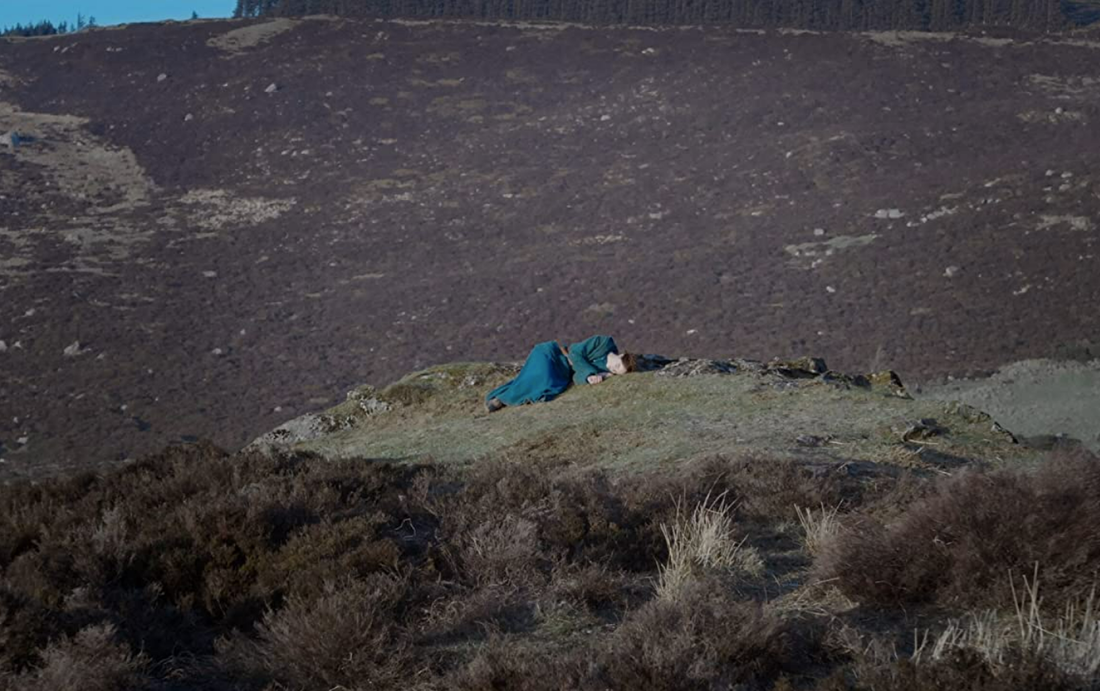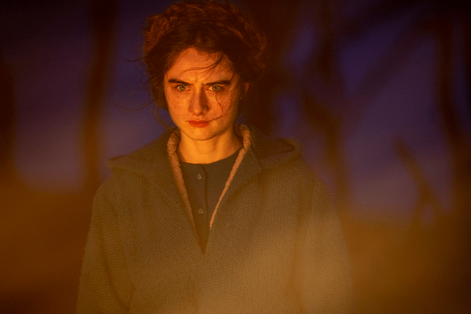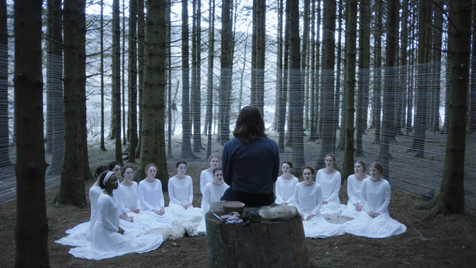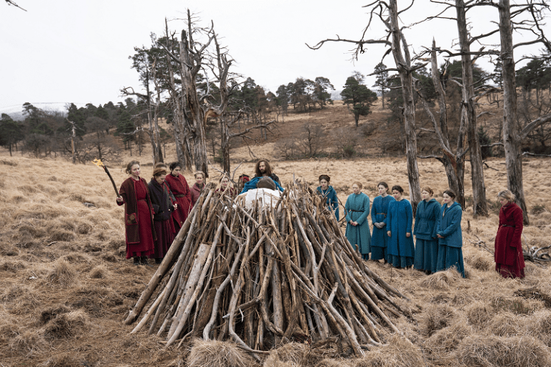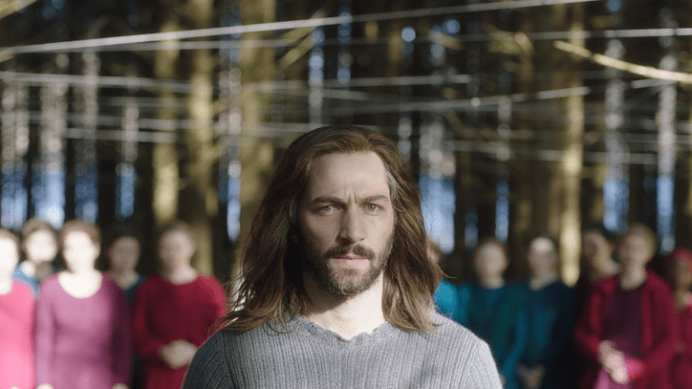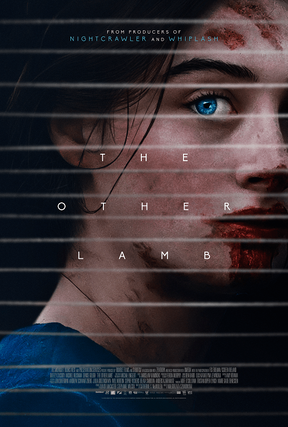|
Originally published on Elements of Madness If Céline Sciamma’s recently released Portrait of a Lady on Fire paints a picture of female community and camaraderie at its best, honing in on the lives of women as they create space for each other outside of patriarchal society, then Malgorzata Szumowska’s The Other Lamb illustrates the opposite end of the spectrum. With a fervent religious cult as the vehicle for its nightmarish story, The Other Lamb spins a haunting tale about the limitations of female friendship and identity under patriarchal influence. This “tale” is, of course, still an everyday reality for many women, and the horrors of the story will no doubt resonate with a large audience. It’s cathartic and angry, but before releasing its rage, it sympathetically explores touchy subjects like desire, Stockholm syndrome, and the confusing web of signification that fights for control over the female body. In an unknown time and location, young Selah (Raffey Cassidy) comes of age within the only community she has ever known: an all female cult led by a single man known only as Shepherd (Michiel Huisman). Shepherd leads his “wives” and “daughters” with the magnetic attraction and charm of a contemporary guitar-wielding evangelical youth pastor. Imitating the savior role of the Biblical Jesus (his shoulder-length hair and kind face even resemble Western artistic depictions of Jesus) and borrowing the language of Judeo-Christian traditions, Shepherd keeps his cult isolated in the woods as they raise a flock of sheep. He demands love and adoration from the women, whipping them into hysterical frenzies with his sermons as he teaches them that they were once “broken things” whom he has purified by rescuing them from the outside world. While Selah has followed Shepherd her entire life with doe-eyed devotion, she begins to question the status-quo as she experiences changes in the community and in her own life. The Other Lamb unfolds like a haunting bedtime story that seeks to warn and inspire, a folktale passed down to illustrate the horrors of the patriarchy and immortalize the women who stood up to it. The twisting bare branches, creeping mists, and whispering creeks in the forest set the stage with a mythic, magical quality. Szumowska successfully creates visceral imagery that you won’t soon forget, invoking fear and disgust as she pairs images of death, blood, and decay with Selah’s crumbling worldview. Glimpses of the modern world (a police car, an imagined character in a letterman’s jacket, and the metal trailers where the women sleep) place the story a little too close for comfort, reminding the audience that these horrific events aren’t just contained in fairy tales. However, The Other Lamb is by no means a true-crime drama, and its purpose is not to remind us of real life brainwashed cults. The film is a shopping cart of your high school English teacher’s favorite literary symbols, and it begs to be understood beyond the fictional space it inhabits. Unfortunately, however, just as Selah struggles to come into her own under the constraints of Shepherd’s cult, The Other Lamb struggles to create a meaningful narrative under the weight of its many symbols. Although the film is filled with popular feminist themes (Ophelia imagery, mothering and birth, menstrual cycles following nature, purity vs. impurity, etc.), it lacks a strong, well-developed narrative to carry these themes and endow them with fresh new meanings. The story starts out strong, introducing Selah as she plays a practical joke on another “sister” and juxtaposing her free spirit with her religious devotion. But just as a folktale in a child’s picture book won’t spend time creating fully realized characters, The Other Lamb presents Selah as more of an empty, representational metaphor than a fully realized consciousness. Of course, it is difficult to develop a female character who lives in a community where she is only defined by her relationship to a man, where she is forbidden to tell stories (one of Shepherd’s rules), and where she is raised to believe that the natural processes of her body make her “impure.” For women both throughout history and today, these limitations are no fairy tale. This may explain the lack of characterization in The Other Lamb: Selah is not a fully-realized and dynamic character because the patriarchy prevents women from becoming fully-realized dynamic humans. Yet, Selah’s character begs for something more. Her desire and curiosity is constantly bubbling just under the surface, and the film would have done well to show more. Instead of creating loose and unexplained connections between Selah’s menstrual cycle and the birth of new lambs, why not explore her suppressed interest in storytelling or show more of her conversations with the other women? If Selah had been a stronger character, her inner conflict and transformation would have had more of an emotional impact. There is, however, one feminist theme that The Other Lamb handles in a refreshing way. The film is not just about being angry at men. It’s about the wide range of emotions that women can experience under patriarchal conditions. It’s about the hard mental work that it takes for oppressed, abused, and ignored women to truly come to believe that they deserve better. The Other Lamb does not shy away from the fact that Selah and her “sisters” desire Shepherd’s love and sexual attention. While they are, of course, brainwashed into this desire, this does not make their feelings for him any less powerful or difficult to overcome. The Other Lamb does not to condone Shepherd’s character or romanticize sexual abuse, but rather acknowledges that women have an extremely tough battle to fight in order to overcome sexist indoctrination. With its pile-up of trite symbols, the meaning of The Other Lamb is certainly up for interpretation. It makes a clear statement about patriarchal indoctrination and abuse, but it also opens the door for broad discussions on other topics such as sexism within religion. While the narrative and characterization may get lost, The Other Lamb is a powerful conversation starter. Much like we want to discuss surreal nightmares as soon as we wake up, The Other Lamb begs for deeper discussion as soon as the end credits roll, lingering in our minds with its disturbing visuals.
0 Comments
Leave a Reply. |
"Our embodied spectator, possibly perverse in her fantasies and diverse in her experience, possesses agency...finally, she must now be held accountable for it." Categories
All
|

